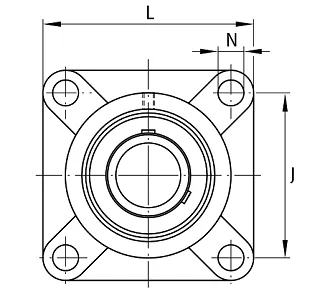Sep . 28, 2024 08:42 Back to list
Suppliers of Various Motor Bearing Types for Your Industrial Needs
Understanding Motor Bearing Types and Their Suppliers
In the realm of electric motors, the functionality and efficiency largely depend on a critical component bearings. Bearings play an essential role in supporting and guiding rotating parts, reducing friction, and enhancing the overall performance of electric motors. As manufacturers and engineers prioritize not just performance but also longevity and reliability, understanding the various types of motor bearings and their suppliers becomes imperative.
Types of Motor Bearings
Motor bearings predominantly fall into two categories rolling bearings and sliding bearings. Each type has unique characteristics and is suited for specific applications.
1. Rolling Bearings These bearings use balls or rollers to reduce friction between moving parts. Rolling bearings can be further classified into - Ball Bearings Known for their versatility and ability to handle both radial and axial loads, ball bearings are commonly used in small to medium-sized electric motors. - Roller Bearings These can carry heavier loads compared to ball bearings and are perfect for applications requiring high radial load capacity. - Thrust Bearings These are specifically designed to handle axial loads and are essential in applications where the motor experiences significant thrust forces.
2. Sliding Bearings Also known as journal bearings, sliding bearings operate on a sliding surface, allowing for smooth motion between parts. While they tend to produce more friction than rolling bearings, they are often employed in high-load applications due to their ability to withstand heavier loads without the risk of failure.
Selecting the Right Bearing
Choosing the right type of bearing for a motor is critical for ensuring optimal performance and durability. Engineers must consider several factors, including load capacity, speed, environment, and potential lubrication methods. For instance, in high-speed applications, rolling bearings may be preferred for their lower friction characteristics, while sliding bearings might be utilized in heavy-duty applications where load-bearing capability is paramount.
motor bearing type suppliers

The Role of Suppliers
The selection of reliable suppliers plays a vital role in ensuring that manufacturers have access to high-quality motor bearings. These suppliers provide a range of products necessary for different types of motors, including standard, specialized, and custom bearings tailored to specific applications.
Several key players dominate the motor bearing supply industry
- Established Manufacturers Companies like SKF, Timken, and NTN have built reputations for producing high-quality bearings suited for various industrial applications. Their extensive product catalogs and technical support make them go-to suppliers for many manufacturers.
- Specialized Suppliers Some companies focus exclusively on specific types of bearings or industries. These suppliers often offer innovative solutions, customized products, and tailored services to meet unique operational requirements.
- Local Distributors For manufacturers who prioritize quick turnaround times and localized support, partnering with local distributors can be an effective strategy. These suppliers can often provide immediate access to inventory, reducing downtime during maintenance or production processes.
Conclusion
In conclusion, motor bearings are pivotal in maximizing the efficiency and reliability of electric motors. Understanding the types of bearings available and their specific applications helps manufacturers make informed decisions that enhance their products' performance. Additionally, selecting the right suppliers is equally crucial, as it ensures that manufacturers receive high-quality components vital for their operations. As the industry continues to evolve, the demand for high-performance motor bearings and reliable suppliers remains steadfast, driving innovation and growth in various sectors. The synergy between advanced bearing technology and competent suppliers will likely shape the future of motor applications across industries.
Latest news
-
25MM 2 BOLT UCFLX05-14 Flange bearing unit( oval)
NewsMar.07,2025
-
4 bolt UCF 200 series Pillow block bearings
NewsMar.07,2025
-
25MM 2 BOLT UCFLX05-14 Flange bearing unit( oval)
NewsMar.07,2025
-
UCF216-50 4-Bolt Flange Housing Square Bearing
NewsMar.07,2025
-
25MM 2 BOLT UCFLX05-14 Flange bearing unit( oval)
NewsMar.07,2025
-
spherical roller bearing material exporter
NewsMar.07,2025





